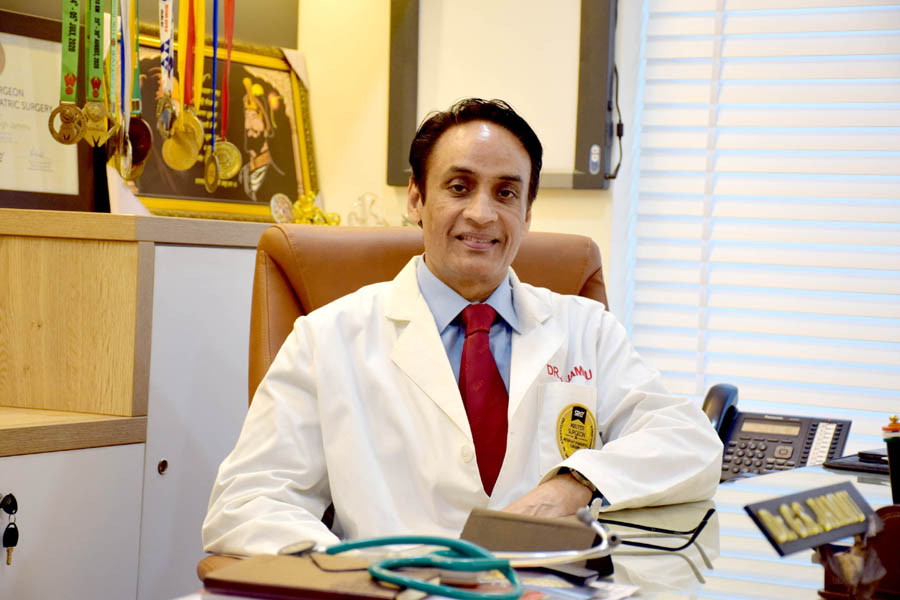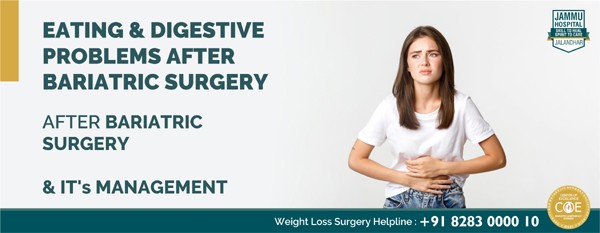Very few percentage of my patients or some patients who are operated at other centres, sometimes they complain of Eating & Digestive Problems after Bariatric Surgery. [ YOUTUBE VIDEO ]
Issues are in the form of Loss of Taste, Loss of Smell, Nausea, Vomiting and Diarrhea.
We will be discussing each of these issues and how can we overcome these problems.
I want to reassure that all these problems are temporary and are going to go away with short span of time.
Table of Contents
Bariatric Surgery Physiology
In bariatric surgery what we have done is we have reduced the size of your stomach and also reduced the size of intestine. These two factors combined make some hormonal changes inside your body in the form of decreased ghrelin levels.
Ghrelin hormone in our body is responsible for hunger. Decreased levels of hormones, send some signals to your brain which lead to the change or altered metabolic pathways of sense of taste or smell.
This is a psychological phenomenon due to hormonal changes and this is temporary and this also helps patients by making them eat less calories and this leads to more enhanced weight loss. This occurs in few percent of patients only.
Nausea and Vomiting after Weight Loss Surgery
Eating & Digestive Problems After Bariatric Surgery, most of the time the problem is physiological, psychological rather than mechanical. The patients eat as they were eating before surgery. Patient tend to eat as they were eating before surgery. They eat with less chewing, not grind their food properly and they eat fast.
We have reduced the size of stomach from big stomach to a small stomach. The small stomach cannot hold large volume of food that is why when you eat fast you have a sensation of full stomach and you tend to throw out your food.
- The first lesson is Grind your food well, chew it properly and then gulp in slowly.
- Avoid taking water with food, 40 minutes before food and 40 minutes after food. If you take water with food it again increases the volume of food and propel your food fast into the intestine, which can lead to nausea and vomiting.
- You should be careful about what you eat. You must do mindful eating.
What is Mindful eating after Bariatric Surgery?
You should know when to eat, when your body is demanding food. When your body sends you signals to eat only then you should eat. If you have sensation of hunger, only then you should eat.
You must not do emotional eating which means if someone is eating junk in front of you, you must not eat with eat, you must know your
right time to eat.
You must take mix of Carbs, Proteins and Fats. You should avoid bad carbs, bad fat. You should have good volume of proteins.
We have observed that while eating,, sometimes people tend to do multi tasking. They are talking to someone or are on phone or they are watching some movie or news.
While doing this they forget that they have to limit their food intake and in this care they tend to eat more. So, you must avoid multi tasking things while eating your food.
When you are eating switch off your electronic gadgets, TV, etc.
Only eat when you are eating and don’t do anything else. So, that you mind knows how much to eat and you stop eating at the first signal from your brain.
Try to eat food which is really good. Don’t stuff yourself with bad food which is processed food or food with trans fat. You can discuss about healthy food with your bariatric surgeon or your dietician.
These are some ways to avoid Eating & Digestive Problems After Bariatric Surgery.
Why change of taste occurs after bariatric surgery?
After bariatric surgery, once we have reduced the size of stomach, we have bypassed some part of intestine. This results in decreased consumption or absorption of essential vitamins and minerals.
The most important vitamins and minerals which lead to loss of sensation of taste are zinc, copper and nickel.
We should be taking supplements for Zinc, Copper and Nickel so that your sense of taste doesn’t change.
Again due to bariatric surgery hormones which stimulate appetite the may decrease and you tend to eat less.
Sometimes, people do complain that they are not able to take plain water. We have seen this is a very common phenomenon. Need not to worry about this, this goes with 30-40% of people who undergo bariatric surgery.
You can add some salt or lemon drops or some other some other flavour thing to your water.
If some vegetable you don’t like in your food, you can add some black pepper, lemon, cinnamon, ginger, garlic, cumin or corriander to make your food tasty.
Diarrhea after Baritaric Surgery?
What I have found in my practice is that after procedure like gastric bypass, you intestine is bypassed and you take food which has a rapid transition from the proximal intestine and into the distal intestine. When undigested food
rapidly without being chemically changed it produces some irritation and you have diarrhea sort of thing.

What Lesson to be learnt after Bariatric Surgery?
- We have to eat slow and make sure that food transition from proximal intestine to distal intestine should be very slow so that the food goes chemical changes and colon doesn’t react to the undigested food.
- There are certain types of food which produce irritation if the large gut, colon and the distal gut and these food may be specially the fats and fatty acid which goes unabsorbed and cause irritation to the colon and cause diarrhea.
- Some people are intolerant to milk because they have defficiency of lactogen digestion. In this case you can take lactogen free milk or replace with milk with butter milk or yogurt, curd which can help you further enhancing protein intake and the same time you don’t have any sensation of diarrhea.
- Certain foods which have some natural sugars like sorbitol, can give the same sensation of diarrhea. These food may be like apples, pear, banana, berries. Some artificial sweetners like zilotol, figs, raisin, grapes, alcohol and fresh juices. processed juices, broccoli, milk. Start avoiding this stuff if you have some sensation of diarrhea.
How to manage Diarrhea after Bariatric Surgery?
- First thing is the diet, you have to take what your nutritionist or bariatric surgeon has guided you. They are the best to guide you.
- Eat much of fibre rich food like oats, dried beans, citrus fruits, peas, avacados, cucumber, carrot, flaxseeds.
- Avoid simple carbs and sugars.
- Make your food diary and find out the food that creates problem for you.
Medical Management of diarrhea after bariatric surgery?
Medical managements consists of some antacids that is proton pump inhibitors. Your bariatric surgeon can tell you the dosage and how frequently you have to take it.
Some tablets to avoid vomiting. You will be guided for probiotics. Probiotics is one thing which is very useful after bariatric surgery. Because after the bariatric surgery sometimes there is decrease in good bacterial growth of the intestine.
So, probiotics are OTC medicines, you must start taking probiotics. Even your curd has good amount of probiotics.
For diarrhea you can be prescribed for loperamide and simethicone tablets. Rifaximin tablets which are good antibiotic.
Biles acids which are produced by the gall bladder and liver which when unabsorbed reach the distal intestine are a great source of irritation. We add bile acid sequestrants so bile is bound and it doesnot go unabsorbed. Bile acid sequestrants like colestyramine and colestipol.
These are readily available but these are prescribe medicines and should be taken only by the guidance of your surgeon.
Then creons which help in the absorption, digestion, breakdown of proteins, fats, carbs. This is also a prescription medicine and should be taken only by the guidance of your surgeon.
People who are not able to absorb enough protein after bariatric surgery they are suggested to take tablet of creon along with their meal.
Jammu Hospital Contact ?
If you have more queries, you can drop a message on Our Contact Form or Call us at : +91 8283 0000 10
Jammu Hospital You Tube Channel ?
You can visit our Youtube Channel Education Series Playlist for Educational Videos regarding Your Query

